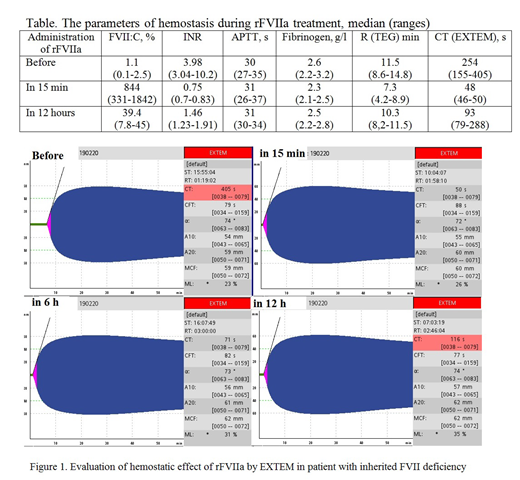Introduction and Objectives: Inherited FVII deficiency is a rare hemorrhagic disorder.Clinical bleeding does not correlate with the level of FVII plasma activity. FVII involves in the extrinsic coagulation pathway. ROTEM is point of care method. EXTEM is one of ROTEM screening tests. EXTEM analyses the extrinsic pathway of coagulation. Aim of the study was to evaluate hemostatic effect and safety of rFVIIa treatment in pts with inherited FVII deficiency.
Materials and Methods: The results of rFVIIa treatment were investigated in 4 pts (1 male, 3 females) with inherited FVII deficiency. Pts were treated with rFVIIa before gynecological (2), abdominal (1) and orthopedic surgery (1). Pts received 30 mcg/kg of rFVIIa (Koagil VII, Generium, Russia) before surgery. Plasma FVII activity, fibrinogen, INR, APTT, ROTEM and thromboelastography (TEG) parameters were investigated before rFVIIa administration, then in 15 minutes, in 2 hours, in 6 hours and in 12 hours.
Results: Before rFVIIa administration median plasma FVII activity was low, CT EXTEM was long and INR was greater than 3. TEG, APTT and fibrinogen were in normal ranges (table 1, fig. 1). Fifteen minutes after rFVIIa administration FVII:C activity increased, INR and CT EXTEM decreased. Hemostatic effect of rFVIIa remained during 12 hours. During this period CT EXTEM correlated with INR (r = 0.97, p<0.001). Other parameters did not change significantly. None patients had hemorrhagic complications.
Conclusion: CT EXTEM allowed to evaluate hemostatic effect of rFVIIa in operating room and good correlated with INR in pts with inherited FVII deficiency.
No relevant conflicts of interest to declare.
Author notes
Asterisk with author names denotes non-ASH members.


This feature is available to Subscribers Only
Sign In or Create an Account Close Modal